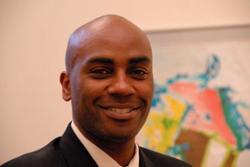Rethinking Literacy in a Digital Age
“In a world where we are told the book is a dying relic and that the word is giving way to the image, why do we insist on teaching the novels, poems, and plays of people who are long since perished; works of fiction and drama written by people who may have held problematic and politically incorrect worldviews that implicitly demeaned the students who are now asked to read and cherish them? Why does the English classroom look so similarly to what it did a generation ago when the world of literacy is so rapidly changing? Should English teaching change as the population of students change? Should we amend our priorities in English education as the communications technologies transform to make life utterly unrecognizable to the worlds that many of our canonized authors inhabit? And what in English is sacred and untouchable? What is essential at the elementary and secondary levels?”
With those questions, Ernest Morrell, Professor of English Education and Director of TC’s Institute for Urban and Minority Education, was installed this past week as President-Elect of the National Council of Teachers of English (NCTE). Morrell took office as the 40,000-member organization held its annual meeting, held this year in Las Vegas.
Morrell, who framed his in a call for proposals for next year’s 103rd annual conference, which he has titled “(Re)Inventing the Future of English,” believes his field stands “at a crossroads where we must simultaneously champion and transform the discipline of English in a rapidly changing world.”
In leading the way on both fronts, Morrell has focused on making English relevant for students. Prior to coming to TC, in his role as Associate Director of the Institute for Democracy, Education, and Access at the University of California at Los Angeles, he worked with high school students in Los Angeles on in-school and out-of-school literacy instruction, cultural studies and civic involvement. In one signature effort, he collaborated with teachers at an East Los Angeles high school to launch “A Day in a Life,” a project in which students wrote about their experiences living and growing up in East L.A. The initiative was so successful that students ended up publishing and describing their work at national conferences. Boston teachers adapted the approach, creating a readers’ theater that Morrell has called “the most powerful thing I’ve seen in 25 years.”
Morrell is also believes fervently that today’s youth not
only can but must be reached via technology. In a Q and A on “SmartBlog on
Education,” he said that “the available communications tools at our disposal
have changed what it means to be literate,” and argued that “a digital literacy
education will help our youth to become better consumers and producers of
information in the digital age.” Teachers must all students to “produce and
distribute information multimodally in classrooms,” he said, and “help them
understand how to decode and deconstruct” the messages of songs, films, videos
and other media.
“Our generation of
English teachers, as others before us, must reevaluate what we do, how we do
it, and why it is all still necessary,” Morrell wrote in his 2013 call for
proposals. “How does it relate, if at all, to English as defined and
taught in undergraduate and graduate level seminars at our colleges and
universities? And, in the spirit of the Japanese concept of Kaizen, or
continuous improvement, what can we do to be more powerful, more relevant and
yet retain our character and traditions?”
In pondering these questions, Morrell wrote, he was reminded of an interview he underwent as a senior in college, as part of the application process for his university’s teacher education program.
“In response to the perennial question (why English teaching and why you), I offered all of the reasons that any relatively successful undergraduate English major of my era would provide -- a love of the text, a love of writing, giving students the gift of language -- and I was stopped mid-flow by the interviewer who kindly reminded me, ‘You don’t teach English, you teach students English.’ That reprimand has stayed with me all these years and it informs my thinking as well as my practice. Truly powerful English must exist as a transaction between our students and the worlds of the past and present as represented through a myriad of texts and genres. Our central task is to ascertain what our students want and need from us in this rapidly changing world and what, from the discipline of English, makes the most sense to give them?”
Published Monday, Nov. 19, 2012
